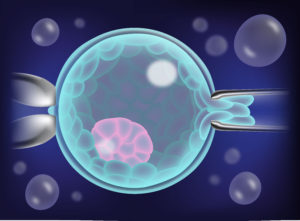PGD (Pre-implantation genetic diagnosis) was developed several years ago and is an excellent technique for diagnosing embryos that have a specific genetic disease such as cystic fibrosis or muscular dystrophy. This helps people who have a strong family history of such conditions to consider only using embryos that are not affected by these conditions.
PGS (Pre-implantation genetic screening) on the other hand is a similar technique applied to embryos in the hope of identifying changes in the numbers of chromosomes in the embryo. Embryos with a normal pattern of chromosomes (euploid) have the best chance of developing into a healthy baby, whereas aneuploid embryos, that do not have the correct number of chromosomes, are less likely to implant and, if they do, the pregnancy is more likely to end in miscarriage or the birth of a baby with a genetic condition.
In recent times, more and more clinics are offering PGS for couples undergoing fertility treatment. The exact place of PGS has yet to be determined as there are still many questions to be answered about the technique. While it can reduce the number of miscarriages and failed pregnancies, it has not yet been shown to increase the number of live births from an IVF or ICSI treatment. There are no studies on the long term effects of this technique as it has just not been around long enough. In addition, the results are not always straight forward. A significant problem is mosaicism, where some cells have a normal number of chromosomes and others don’t. In these cases, it can be difficult for geneticists to determine the likely outcome of such pregnancies. There have also been cases of false positive and false negative test results.
For all these reasons, Merrion Fertility Clinic’s policy at present is to recommend PGS for certain of our patients but not for all couples undergoing IVF. However, we are cognisant that this is an evolving issue and that, as more studies are done, hopefully, the true role of PGS and its place in fertility treatment will be established.
Recently the HFEA, the official regulatory body for Assisted Reproduction in the UK, determined that PGS should be classified as a ‘red status IVF treatment add on’ i.e. that ‘there is no evidence that the treatment is effective and safe’. This decision is controversial. It certainly has merit but others in the field disagree. For that reason Merrion Fertility Clinic, as described above, takes an individualised approach to patients when discussing the benefits and risks of PGS.
For more reading:
